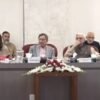ISLAMABAD: Foreign Office spokesperson Ambassador Tahir Hussain Andrabi said Sunday that the Afghan Taliban are not a single monolithic group: while some elements favour calm, others supported by external actors are actively trying to inflame tensions with Pakistan.
Andrabi recalled that since the Taliban took control in 2021, Pakistan has seen a steep rise in militant strikes originating from Afghan territory. Despite suffering both military and civilian losses, he said Islamabad has exercised restraint and avoided retaliatory measures.
Pakistan’s outreach met with little action
Pakistan, he said, had hoped the Taliban government would eventually clamp down on groups attacking Pakistan from Afghan soil. Islamabad has extended numerous goodwill measures from trade concessions to humanitarian assistance and facilitation of education and medical visas yet, Andrabi claimed, Taliban authorities have largely offered empty assurances and failed to act. Instead of tackling terrorism, he added, the Taliban have sought to divert attention with what he called “irrelevant and hypothetical” claims that obscure their international responsibilities. “By muddying the waters, the Taliban regime seeks a narrative that absolves it of commitments to the international community and its own people,” the statement read.
Ceasefire, talks and accountability
Referring to Pakistan’s October 2025 response to cross-border strikes, Andrabi said it underlined Islamabad’s determination to defend its territory and citizens. He reiterated Pakistan’s position that the TTP/FaK and BLA/FaH are enemies of the state, and warned that anyone who shelters, aids, or funds these groups cannot be considered an ally.
Pakistan agreed to peace talks mediated by Türkiye and Qatar, Andrabi noted, with force described as a last resort. The first Doha round produced a temporary ceasefire based on mutual understandings; Istanbul was intended to translate that into implementation mechanisms. But, he charged, the Taliban delegation reneged on commitments and sought to poison the atmosphere with unfounded media claims.
At later sessions, Pakistan pushed for a monitoring mechanism to verify Taliban action against militant groups. According to Andrabi, the Afghan side instead sought to extend the ceasefire period without taking “concrete and verifiable” measures against the TTP/FaK and BLA/FaH.
Not refugees — militants, Pakistan says
Andrabi accused Taliban officials of mischaracterizing Pakistani militants in Afghanistan as refugees. He said many fighters who fled Pakistan during Operation Zarb-e-Azb in 2015 are now being sheltered and equipped in Afghanistan, and that some have set up training camps to launch attacks inside Pakistan.
“These militants aided the Afghan Taliban against ISAF and the then-Afghan government,” the spokesperson said, arguing that their current protection in Afghanistan is effectively a reward for that past support. Islamabad has repeatedly demanded the handover of such individuals, he added, but the Taliban have refused, claiming lack of control — a claim Pakistan views as a question of intent rather than capability.
Hostile narrative, ethnic nationalism and fatwas
Andrabi said certain Taliban elements, together with anti-Pakistan militants and their backers, have found it politically useful to stoke hostility toward Pakistan as they seek legitimacy and cohesion at home. He warned that these actions are eroding whatever goodwill the Taliban once enjoyed in Pakistan.
The Foreign Office also rejected suggestions of a split within Pakistan over Kabul policy, saying the nation stands united with its armed forces against terrorism. Andrabi criticized attempts to inflame Pashtun nationalism across the border, stressing that Pashtuns are an integral and prominent part of Pakistan’s social and political fabric. “There are more Pashtuns in Pakistan than in Afghanistan,” he said, and urged the Taliban to focus on inclusive governance at home.
He also pointed to Afghan-issued fatwas that, he said, have been used to legitimize attacks on Pakistan, and noted that many Afghan nationals now figure in networks targeting Pakistani interests.
Dialogue but no dealings with terrorists
Andrabi closed by reaffirming Pakistan’s preference for dialogue and peaceful solutions, while underscoring that terrorism emanating from Afghan soil remains the principal concern. He reiterated Pakistan’s refusal to negotiate with designated terrorist organisations be they TTP/FaK or BLA/FaH and stressed the country’s resolve to act against those who support or finance violence.



